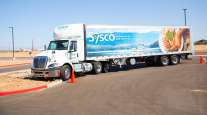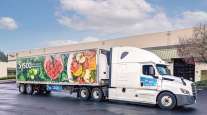Sysco to Buy U.S. Foods, Its Largest Competitor
This story appears in the Dec. 16 print edition of Transport Topics.
Sysco Corp., the nation’s largest independent food distributor, said it will acquire its largest rival, U.S. Foods, creating a company with $66 billion in annual sales and a private truck fleet that will be the second largest in North America.
Houston-based Sysco said it will pay about $3.5 billion in cash and stock and take on $4.7 billion in debt to acquire privately held U.S. Foods, which is based in Rosemont, Ill.
Sysco ranks No. 3 on Transport Topics’ Top 100 Private Carriers list with 7,941 tractors, and U.S. Foods ranks No. 5 with 5,437 tractors.
The combined fleet of 13,378 tractors would be second only to PepsiCo Inc. in terms of number. Sysco also operates a sizeable fleet of medium-duty delivery trucks, and together the two companies use more than 16,400 trailers to distribute food from distribution centers to hundreds of thousands of restaurants, schools, hospitals, hotels and other commercial eating establishments.
However, the plan could face antitrust hurdles, said a report from Cantor Fitzgerald analyst Ajay Jain, who estimated the companies combined would have a 30% market share.
Sysco President Bill DeLaney said the merger will accelerate the company’s efforts to provide customers with “highly differentiated products and services.”
But DeLaney also acknowledged on a conference call that some assets may need to be sold in order to obtain regulatory approval.
Sysco said it controls about 18% of a $235 billion market for foodservice in the United States and Canada, and that U.S. Foods is second with 9%. Performance Food Group is ranked third with 5% of the market, based on sales in 2012.
U.S. Foods said it had about $22 billion in annual revenue. Meanwhile, Sysco said for fiscal year 2013 that ended June 29, it generated record sales of more than $44 billion.
“Sysco and U.S. Foods have highly complementary core strengths, including a broad product portfolio and passionate food people deeply committed to customer service, quality-assured products and safety,” DeLaney said in a Dec. 9 statement announcing the merger.
U.S. Foods President John Lederer said, “Combining and maximizing the significant strengths of two outstanding companies is certain to be of tremendous advantage in supporting our customers as they tackle the challenges of today’s demanding environment.”
Private equity firms Clayton, Dubilier & Rice LLC and Kohlberg Kravis Roberts & Co. LP, which bought U.S. Foods from Dutch grocery store operator Royal Ahold in 2007 for about $7.1 billion, will retain 13% ownership in the combined company.
The merger of Sysco and U.S. Foods breaks a pattern of larger companies buying up smaller competitors and may signal the beginning of a broader industry consolidation as distributors move to counter stagnant revenue growth and shrinking profit margins, industry officials said.
“The foodservice distribution industry is highly competitive and is a mature industry characterized by slowing revenue growth,” Sysco officials said in a filing with the Securities and Exchange Commission. “Increased competition from nontraditional sources, such as club stores and commercial wholesale outlets with lower cost structures, group purchasing organizations or consolidations among competitors have served to further increase pressure on the industry’s profit margins. . . . We expect these trends to continue for the foreseeable future.”
Sysco said it expects to save $600 million annually three or four years after closing the purchase by cutting duplicative merchandising and back-end office systems and through greater supply chain efficiencies.
Sysco spokeswoman Wendy Olson declined to say how much overlap exists in terms of equipment and facilities.
“Both companies will continue to operate as independent entities until after the merger closes, likely some time in the third quarter of fiscal year 2014 and contingent on regulatory review,” Olson said.
Sysco is in the process of implementing a new enterprisewide software system and recently has taken steps to strengthen its food-safety practices.
In September, Sysco eliminated the use of temporary drop sites for food shipments after finding problems with a Sysco operating company in San Francisco.
Sysco and U.S. Foods have been active in making smaller acquisitions to grow their market share.
Sysco acquired nine businesses in its last fiscal year, including four foodservice companies in December 2012. U.S. Foods acquired Glover Wholesale Co. in 2012 and Quandt’s Foodservice Distributors in October.
Other recent acquisitions involving other foodservice companies include the purchase of Meadowbrook Meat Co. by McLane Co. in 2012, and the purchase of Southern Foods Inc. by Reinhart FoodService, a unit of Reyes Holdings, in July.
McLane and Reyes rank No. 7 and No. 10, respectively, on the TT Private Top 100 list.
Performance Food Group, ranked No. 15, completed three acquisitions in the past two years — Fox River Foods, Institution Food House and Liberty Distribution Co.



